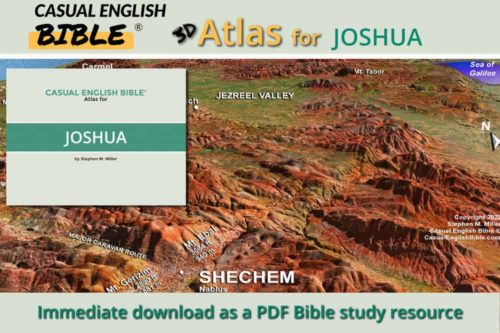Joshua 17
Women get land, too
Women get land, too
1This is a list of cities and regions assigned at random [1] to the tribe of Manasseh. Manasseh was Joseph’s oldest son. Manasseh’s oldest son was Machir. And Machir’s oldest son was Gilead. The families who came from Machir and Gilead became known as the Machir clan of extended families. Machir was a courageous soldier. His clan settled east of the Jordan River, in the regions of Gilead and Bashan. [2] 2The other half of Manasseh’s tribe settled west of the Jordan River. These family clans also descended from Manasseh: Abiezer, Helek, Asriel, Shechem, Hepher, and Shemida.3Zelophehad was another descendant of Manasseh. But he didn’t have any sons to inherit his land. He was a son of Hepher, grandson of Gilead, great-grandson of Machir, and great-great grandson of Manasseh. He had five daughters: Mahlah, Noah, Hoglah, Milcah, and Tirzah.
4His daughters went to see Eleazar the priest, Joshua the son of Nun, and the other leaders of Israel. The women said, “The LORD told Moses to give us land, just like the men in our family are getting.” So, Eleazar and the others did what the LORD said. 5Because of that, Manasseh’s tribal territory west of the Jordan River was divided 10 ways. [3] East of the river there were two more territories: Gilead and Bashan. [4] 6So, the women of Manasseh got land west of the Jordan River, just as the men did. East of the river, other men from Manasseh’s tribe received Gilead.
Manasseh’s boundaries
7Manasseh’s northern boundary started at the southern border with Asher’s tribe. It went south to Michmethath, east of the city of Shechem. The boundary then dropped southward into the land of the En-tappuah people. 8So, Tappuah territory belonged to Manasseh. But the town of Tappuah is on Ephraim’s side of the boundary. 9Manasseh’s boundary line continued down to Dry Creek Kanah, [5] and ran along the northern side of the dry creek all the way to the Mediterranean Sea. Towns in this area of Manasseh belong to Ephraim’s tribe. 10Land south of the dry creek belonged to Ephraim, and north of it to Manasseh. The Mediterranean Sea served as Manasseh’s western border. Asher’s tribe was on Manasseh’s northern border. And Issachar’s tribe was east of Asher.11Manasseh owned the following towns with their outlying suburbs—all along the borders with Asher and Issachar: Beth-shean, Ibleam, Dor, En-dor, Taanach, Megiddo. 12The bad news is Manasseh didn’t conquer any of those cities. Canaanites kept living there. 13Later, when Israel grew stronger, they forced the Canaanites to work for them as slaves. But Israel didn’t drive out the Canaanites.
Joseph’s tribes want more land
14Leaders from Joseph’s tribes of Manasseh and Ephraim told Joshua, “Out of all this land God gave to us, why did you assign us such a small piece. We have a lot of people. This land isn’t big enough for us.”15Joshua said, “Well, if you’ve got too many people for the hill country, I have an idea for you. Send your people into the woods of the Perizzites and the Rephaim. Tell them to clear the land and make more room for themselves.”
16The tribal leaders said, “You’re right. There aren’t enough hills in Ephraim. But we’re not strong enough to capture Canaanite cities in the plains and valleys. Those people are fierce warriors with state of the art weaponry, including iron chariots. They’re in Beth-shean and outlying villages. And they’re all over the place in the Valley of Jezreel.”
17Joshua told those people from Ephraim and Manasseh, “Come on, you have a lot of people, and you’re strong together. So, we’re not giving you just one piece of land. 18We’re also giving you the wooded hills so you can clear them and then fill the land with your people. Take the land from the Canaanites, too. They’re fierce warriors with iron chariots, but you’ll drive them out of here.”
Footnotes
More literally, they used “lots.” The “lots” may have been stones or animal bones marked in a way that produced random outcomes for “yes” or “no” answers, or for determining who goes first in a group. The idea is like throwing dice, with the high number going first. It’s also a little like “heads” or “tails” from a coin toss. It might have looked like a random-chance technique. But Jews taught that God controlled the outcome.
Numbers 32.
Scholars guess that the land was divided among the six family groups mentioned in 17:2. But Hepher’s land went to his son who didn’t have any sons of his own. He had five daughters. So, his share of land was divided among his five daughters, the granddaughters of Hepher.
Half the tribe of Manasseh settled in Gilead and Bashan. Moses had previously given land to the tribes of Reuben, Gad, and half the tribe of Manasseh. Leaders of those tribes said they liked the land east of the Jordan because it was good for grazing their livestock. So, Moses gave it to them (Numbers 32:33).
Literally “Wadi Kanah,” also called Nahal Qana. A wadi is a normally dry pathway that can become a river during a flash flood or in the rainy season of winter in what is now Israel and Palestinian Territories.
Discussion Questions
- Sorry, there are currently no questions for this chapter.







